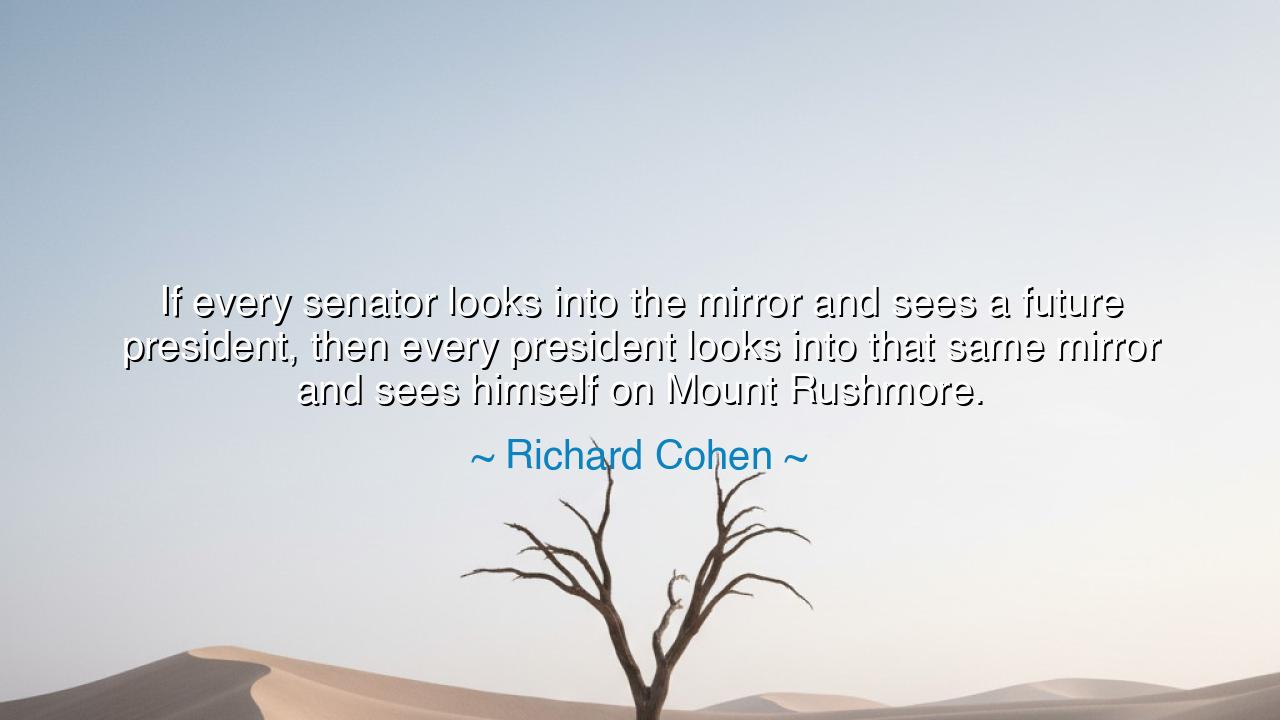
If every senator looks into the mirror and sees a future
If every senator looks into the mirror and sees a future president, then every president looks into that same mirror and sees himself on Mount Rushmore.






"If every senator looks into the mirror and sees a future president, then every president looks into that same mirror and sees himself on Mount Rushmore." – Richard Cohen.
In this evocative reflection by Richard Cohen, we are called to examine the nature of ambition, ego, and the power of perception. The mirror, in this context, becomes a symbol not only of self-reflection but of self-deception. When a senator gazes into it, he imagines himself as the president, believing the path ahead is paved for him. But when the president looks into the same mirror, he sees not just himself as he is, but as the symbol of all power, the embodiment of legacy, standing triumphantly on the sacred ground of Mount Rushmore. It is a vision of greatness, a distorted reflection of self that is fueled by the need to be remembered, to be immortalized.
The ancient sages often spoke of hubris, the dangerous pride that leads one to seek power not for the sake of the people but for the sake of one’s own glory. This is the very trap that Richard Cohen highlights: the illusion of greatness that takes root in the hearts of those who seek the highest office. A senator, through ambition, sees not the work and service required to lead a nation, but the lofty throne of power itself. Similarly, the president, having reached that throne, sees not the challenges and compromises that have shaped his reign, but the eternal image of his face carved into stone for all to admire. It is the flaw of perception that both blinds and elevates, leading these individuals to forget the fragile nature of their true humanity.
The ancient Greeks warned against the folly of unchecked ambition, which could lead even the most noble hearts astray. Consider the story of Alexander the Great, who, after conquering much of the known world, began to see himself as not just a king, but a god. His vision of greatness became so inflated that he sought to carve his own legend into the very fabric of history, even at the cost of his own humanity. His pride blinded him to the reality that true leadership does not lie in self-glorification but in the service of others. In the same way, the senator and the president in Cohen’s quote have forgotten that true greatness is not found in how the world sees them but in how they see the world and those they serve.
It is said that the greatest leaders of history, from Cyrus the Great to Nelson Mandela, were not those who sought power for their own glory, but those who understood that power was a means to an end, not the end itself. These leaders were not seduced by the image of their faces etched into the annals of history. They were driven by a deep sense of duty, of service, and of humility. They understood that their legacies were not created by the mirror but by the real, often difficult, work they did in the present to shape a better world for future generations. True leaders do not see themselves on Mount Rushmore—they see the road ahead, fraught with challenges and choices, and they focus on making those choices wisely and justly.
And yet, ego has a powerful hold on the human spirit. The desire to be remembered, to leave behind a mark of significance, is woven into the very fabric of our existence. It is a double-edged sword, capable of both inspiring greatness and leading to ruin. This is the essence of the mirror Cohen describes: it reflects not the truth of who we are but the fantasy of who we wish to be. In this way, it is easy to mistake ambition for destiny and to forget that the true legacy of a leader is not written on stone, but in the hearts of the people they serve.
Thus, what lesson can we take from this? We must be mindful of the mirror’s reflection and the power it holds over our perceptions. Just as the senator must recognize that true leadership is earned through service, not through self-image, the president must understand that the pedestal on which he stands is built not by his own vision of greatness but by the collective efforts of all who came before and after him. True greatness is not measured by how the world sees us, but by how we serve and empower others. We must learn to see the mirror not as a tool for self-glorification, but as a reminder of our duty to the world and to those we lead. In the end, it is not the stone that holds our legacy, but the lives we touch and the choices we make.
To embrace this wisdom is to set aside the illusions of grandeur and to focus on the reality of leadership—the hard, often thankless work of guiding, protecting, and serving. When we look into the mirror, let us ask not, “How can I be great?” but rather, “How can I be of service to those who need me?” In this way, we find our true legacy, not carved in stone, but lived in action, in humility, and in the choices we make today.






AAdministratorAdministrator
Welcome, honored guests. Please leave a comment, we will respond soon